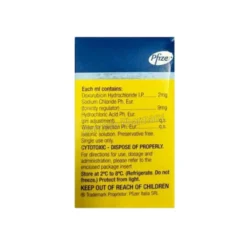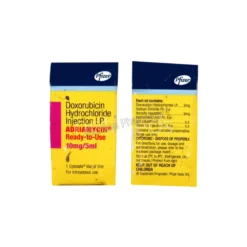Adriamycin 10mg Doxorubicin Injection
$53.00 – $480.00Price range: $53.00 through $480.00
Adriamycin 10 is used to treat various types of cancer, including breast cancer, leukemia, and lymphomas. It contains Doxorubicin, which works by interfering with the growth and spread of cancer cells.
| Pack Size | Price | Price / Unit | Quantity | |
|---|---|---|---|---|
| 1 Injection | $53.00 | $53.00/ unit | ||
| 5 Injections | $250.00 | $50.00/ unit | ||
| 10 Injections | $480.00 | $48.00/ unit |
Looking for bulk / B2B pricing? | Send Inquiry |

| SKU | 11117 |
| Manufacturer | Pfizer Limited |
| Categories | Anti Cancer |
| Delivery Time | 10 - 14 Working Days |
| Strength | 10mg |
Introduction to Adriamycin 10 mg Injection
Adriamycin 10mg Injection is used in the treatment of various types of cancers of blood, breast, lung, ovaries and soft tissues. It can be used on its own, or sometimes given together with certain other medicines as part of combination chemotherapy.
It is given as a drip or infusion vein with extreme caution by a qualified medical professional. Your doctor will decide what dose is necessary and how often you need to take it. This will depend on what you are being treated for and may change from time to time. You should take it exactly as your doctor has advised.
Taking it in the wrong way or taking too much can cause very serious side effects. It may take several weeks or months for you to see or feel the benefits but do not stop taking it unless your doctor tells you to. It makes contraceptive pills less effective, so it advised to both male and female to use reliable contraception during the treatment.
Uses of Adriamycin 10 mg
Adriamycin is the brand name for the chemotherapy drug doxorubicin, which is used in the treatment of various types of cancer. It belongs to a class of medications called anthracyclines. Adriamycin 10 mg is a specific dosage of this medication. Here are some of the common uses of Adriamycin (doxorubicin):
- Breast Cancer
- Cancer
- Hodgkin Lymphoma
- Non-Hodgkin Lymphoma
- Leukemia
- Soft Tissue Sarcomas
- Ovarian Cancer
- Bladder Cancer
- Multiple Myeloma
- Other Cancers
How Does Adriamycin 10 Works?
Adriamycin 10 mg Injection has an active ingredient; Doxorubicin is an Anti-cancer medication which works by suppressing the activity of an enzyme (Topoisomerase) involved in DNA multiplication of the cancer cells. It forms harmful chemicals (free radicals) which cause DNA damage. This slows the growth of breast cancer cells & eventually kills them.
Side Effects of Adriamycin
Common Side Effects
- Vomiting
- Allergic reaction
- Nausea
- Mouth sore
- Hair loss
- Stomach pain
- Eye disorder
- Increased thirst
- Arrhythmia (irregular heartbeats)
Serious Side Effects
- Fatigue
- Low Blood Cell Counts
- Mouth Sores
- Heart-related Effects
- Skin Changes
- Nail Changes
- Changes in Urine Color
- Mouth and Throat Irritation
- Risk of Infection
Dosage of Adriamycin 10 mg
Adriamycin (doxorubicin) 10 mg is a chemotherapy drug used to treat various cancers, including breast cancer, leukemia, and lymphoma. The dosage of Adriamycin depends on factors such as body surface area (BSA), overall health, and specific treatment protocols.
It is typically administered as an intravenous (IV) infusion, either alone or in combination with other chemotherapy agents. The standard dose for adults ranges from 40–75 mg/m² every 21 days or 20–30 mg/m² weekly, depending on the cancer type and regimen.
Dosage adjustments may be necessary for patients with liver impairment or those at risk of severe toxicity. The cumulative lifetime dose should not exceed 450–550 mg/m² due to the risk of cardiotoxicity. Side effects include nausea, vomiting, hair loss, and low blood cell counts.
How to Manage Side Effects?
- Contact Healthcare Provider
- Follow Prescribing Instructions
- Stay Hydrated
- Manage Nausea and Vomiting
- Monitor Blood Counts
- Infection Prevention
- Manage Hair Loss
- Emotional Support
Warning & Precautions
1. Cardiotoxicity
- Adriamycin can cause serious heart damage, including heart failure, which may occur during or even years after treatment. The risk increases with higher cumulative doses, previous heart disease, prior chest radiation, or use of other cardiotoxic drugs. Regular cardiac monitoring (e.g., echocardiograms) is essential.
2. Myelosuppression
-
Adriamycin suppresses bone marrow function, leading to low white blood cells (increased infection risk), anemia, and low platelets (bleeding risk). Frequent blood tests are required to monitor blood cell counts, and treatment may need to be delayed if levels drop too low.
3. Hepatic Impairment
-
Since Adriamycin is metabolized by the liver, patients with liver disease require dose adjustments. Liver function tests should be performed before and during treatment.
4. Extravasation Risk
-
Adriamycin is a vesicant, meaning it can cause severe tissue damage if it leaks from the vein during administration. If extravasation occurs, immediate medical intervention is needed to prevent necrosis.
5. Secondary Malignancies
-
Long-term use of Adriamycin can increase the risk of developing secondary cancers, such as leukemia. Patients should be monitored for signs of new malignancies even after treatment ends.
6. Gastrointestinal Toxicity
-
Severe nausea, vomiting, and mucositis (mouth sores) are common side effects. Anti-nausea medications and supportive care can help manage symptoms.
7. Fertility and Pregnancy Risk
- Adriamycin can cause infertility in both men and women and may harm an unborn baby. Effective contraception is required during treatment, and fertility preservation should be discussed before starting therapy.
8. Radiation Sensitization and Recall
-
Adriamycin may enhance the effects of prior radiation therapy, increasing toxicity to previously irradiated areas. It can also trigger “radiation recall,” where the skin reacts as if it were recently exposed to radiation.
Safety Advice
- Medical Supervision
- Allergies
- Pregnancy and Breastfeeding
- Medical History
- Dosage
- Intravenous Administration
- Monitoring
- Cardiac Monitoring
- Infection Prevention
- Blood Count Monitoring
FAQs – Frequently Asked Questions
1. How is Adriamycin Administered?
Adriamycin is typically administered intravenously (IV) by a healthcare professional in a hospital or clinic setting. The dosage and frequency of administration depend on the specific cancer being treated, the patient’s overall health, and other factors determined by the oncologist.
2. Are There Any Precautions or Contraindications Associated With Adriamycin?
Yes, Adriamycin may not be suitable for everyone. Individuals with pre-existing heart conditions, liver problems, or a history of allergies to anthracyclines should not use this medication. Additionally, pregnant or breastfeeding individuals should avoid Adriamycin due to potential harm to the fetus or infant.
3. Can Adriamycin Interact With Other Medications or Substances?
Yes, Adriamycin can interact with certain medications and substances, potentially affecting their effectiveness or increasing the risk of side effects. Inform your healthcare provider about all the medications, supplements, or herbal products you are currently taking before starting Adriamycin.
| Pack Size | 1 Injection, 10 Injections, 5 Injections |
|---|---|
| Price/Unit | $48/unit, $50/unit, $53/unit |
Be the first to review “Adriamycin 10mg Doxorubicin Injection” Cancel reply
Related Products
Anti Cancer
Anti Cancer









Reviews
There are no reviews yet.